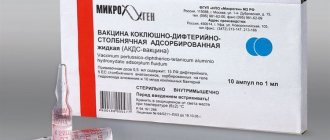Is there a vaccine against pneumonia?
To figure out whether there is a vaccine for pneumonia, you should first find out what kind of disease it is and what its causes are. Pneumonia is an infectious inflammatory lesion of the lung tissue that occurs as a result of the activity of pathogenic microorganisms (bacteria, viruses, fungi). This often occurs as a result of infection by airborne droplets or the development of a secondary bacterial infection as a complication of acute respiratory viral infections (influenza, measles) against the background of a decrease in immune defense and changes in the properties of secreted bronchial mucus.
Inflammatory damage to the lungs can lead to irreversible consequences in a short time. The difficulty of treating pneumonia lies in the fact that in the case of a viral infection, in most cases, it is not possible to influence the pathogenic flora due to the lack of antiviral drugs, and in the case of a bacterial infection, the bacteria have developed resistance to many of the antibiotics. To combat some of the dangerous pathogens of pneumonia, preventive vaccines have been created, thanks to which you can at least partially protect yourself from the disease.
What type of pneumonia are they vaccinated against?
It has been established that most typical pneumonias are caused by pneumococci (Streptococcus pneumoniae), less often by Haemophilus influenzae. It is worth understanding that these same microorganisms provoke damage not only to the lungs, but also to other organs and tissues (the inner lining of the heart, the middle ear, the sinuses, the brain, the blood). Therefore, vaccination against pneumonia caused by certain types of microbes will protect the body from diseases that can develop under their influence.
At the moment, there are the following types of vaccinations against pneumonia:
- anti-pneumococcal vaccine;
- vaccination against pneumonia caused by Haemophilus influenzae.
Who is immunized for?
Vaccination can significantly reduce the threshold for infection of the population with bacteria and ensure a mild course of the disease when infected. Vaccinations against pulmonary inflammation are indicated not only for children, preschoolers, and pensioners, but also for:
- citizens with weak immune systems;
- patients with diabetes mellitus;
- lovers of alcohol and cigarettes;
- people with a history of chronic diseases that suppress the immune system.
The vaccine must be administered to citizens with persistent foci of infection, including patients with tuberculosis. The vaccination is carried out after a preventive examination; the doctor is obliged to exclude the presence of contraindications in the patient. The person being vaccinated should not have:
- acute inflammatory diseases, including infectious ones;
- blood transfusion procedures, meaning the period including the last 4 months;
- skin sensitivity;
- aggravated chronic pathologies;
- allergic reactions to previous vaccines.
The vaccine is not given in the first and second trimesters of pregnancy, in patients with HIV and oncology.
Is there a vaccine for SARS?
A group of pneumonias accompanied by unusual clinical manifestations (without high fever, classic respiratory symptoms) and caused by various atypical pathogens, often diagnosed only by radiography or computed tomography. Moreover, such lesions can secretly lead to severe syndromes and respiratory failure. Atypical pneumonia is provoked by many viral and bacterial pathogens: mycoplasma, legionella, measles viruses, coronaviruses, influenza viruses, cytomegaloviruses and others.
When discussing whether a vaccine against SARS exists or not, it is necessary to clarify the lesion of what origin we are talking about. Recently, in connection with outbreaks of coronavirus infection SARS-CoV, first recorded in China, atypical pneumonia in everyday life means inflammation caused by this virus. So far, neither an effective vaccine against SARS, caused by the SARS-CoV virus, nor drugs against this infection have been created. Also, no vaccination against pneumonia will yet protect against other pathogens, except pneumococci and Haemophilus influenzae.
What is the name of the pneumonia vaccine?
To date, the following vaccines have been approved for use in our country:
- Pneumo-23 (France) – against 23 serotypes of pneumococci;
- Prevenar (USA) – for protection against 7 strains of pneumococci;
- Prevenar-13 (USA) – against 13 strains of pneumococci;
- Hiberix (Belgium) – against Haemophilus influenzae type b;
- ACT-HIB (France) – against Haemophilus influenzae type b;
- Synflorix (Belgium-Russia) – against 10 types of pneumococcus and untyped hemophilus influenzae infection.
Regardless of what the pneumonia vaccine is called, what pharmaceutical company or what country it is produced in, each of these vaccines performs the same basic function. After administration, vaccines provoke certain reactions in the immune system and the production of protective antibodies (the so-called “immune memory” is formed), due to which the body resists the development of the disease when pathogens enter.
Minuses
- Vaccine components, although extremely rare, can cause severe allergic reactions.
- The Prevenar vaccine does not contain all serotypes of pneumococcus that can cause infections in children.
- Children with weakened immune systems do not tolerate this vaccination well.
Composition of the pneumonia vaccine
To prevent pneumococcal and hemophilus influenzae infections, two types of vaccines are used, differing in composition:
- Polysaccharides
(pneumonia vaccination Prevenar, Prevenar-13) – include fragments of capsules (polysaccharides) of common strains of pneumococcus as an antigen responsible for the formation of immunity; can only be used for patients over 2 years of age (due to the immaturity of the immune system of young children). - Conjugated
(pneumonia vaccine Pneumo-23, Synflorix, Hiberix, ACT-HIB) - in them, to form a full immune response, weakly immunogenic components are combined with proteins of other microorganisms that cause adequate reactions; can be used up to two years of age.
The vaccine material under consideration does not contain whole-cell living microorganisms, but only their carefully purified antigenic particles. They are not capable of causing a full-fledged disease, but they allow the immune system to remember the characteristic signs of infectious agents in order to quickly respond when encountering them - identify and neutralize them.
Kinds
Today, vaccines against pneumonia are widely used, called “Prevenar”, “Prevenar-13”, “Pneumo-23”.
The Prevenar vaccine was originally invented for children; later, auxiliary antigens were introduced into its structure, increasing the number to thirteen. Then the vaccine with this name began to be used for people of different age categories, for example, up to the age of five, from five years to seventeen years, after eighteen years and in old age after fifty years.
Vaccination against pneumonia - indications
The vaccine against pneumonia has recently been included in the schedule of mandatory vaccinations that children receive shortly after birth. If vaccination has not been carried out within 2 years, it is recommended that it be given to people and risk groups in whom pneumococcal infection can be especially severe:
- elderly over 65 years of age;
- patients with diabetes mellitus, chronic pathologies of the lungs, heart, liver, kidneys, sickle cell anemia;
- those suffering from alcohol addiction;
- patients with a cochlear implant, with a spinal shunt, with a removed spleen;
- HIV-infected;
- cancer patients;
- workers exposed to inhalation of vapors at work.
Vaccination against pneumonia and other pathologies associated with Haemophilus influenzae infection is recommended for children under 5 years of age who belong to the following risk groups:
- with immunodeficiency conditions;
- having anatomical defects leading to an increased risk of disease;
- suffering from oncohematological diseases;
- children born to HIV-infected women;
- children with HIV infection;
- children who are in orphanages.
If there is an increased risk of invasive Haemophilus influenzae infection, vaccination may be recommended for older children and adults if not previously given. For example, in such cases:
- sickle cell anemia;
- removed spleen;
- immunoglobulin immunodeficiency;
- cancer;
- HIV infection;
- hematopoietic stem cell transplantation.
Contraindications
The vaccine is not given if:
- The child was found to be intolerant to the pneumococcal vaccine.
- The baby has an acute illness or any chronic illness has worsened.
- The child's body temperature is elevated.
In case of intolerance, vaccination with the pneumococcal vaccine is canceled, and in other cases it is postponed until the baby recovers. After blood transfusion, vaccination is carried out 3-4 months later. If you ignore contraindications and vaccinate a sick baby, his condition will sharply worsen.
You can learn even more about pneumococcus by watching the following video.
How is the pneumonia vaccine given?
To reduce the risk of side effects and complications, you should monitor your health for 1-2 weeks before getting vaccinated against pneumococcal pneumonia or hemolytic infection. It is recommended to take a general blood and urine test, visit a therapist, neurologist and cardiologist, and, if necessary, conduct an ultrasound of the internal organs. In addition, it is advisable to avoid crowded places, and those suffering from allergies need to take antihistamines for several days.
Pneumonia vaccination schedule
How often the pneumonia vaccine is given depends on the type of vaccine and the age of the patient. In most cases, immunization with the vaccines in question is carried out for children under one year of age with three administrations (1.5 month interval) followed by a single revaccination in the second year of life. When starting vaccination after a year and for adult patients, one dose is administered once. Vaccines can be used at any time of the year and are compatible with other vaccinations. They are administered intramuscularly - for adults into the deltoid muscle of the shoulder, and for children into the femoral muscle (upper outer surface).
pros
- The vaccine acts against pneumococci, protecting the child from pneumonia, endocarditis, otitis, meningitis, arthritis and other infections caused by this type of streptococcus. Even if the disease appears, its course will be mild.
- Pneumococcal vaccines rarely cause adverse reactions.
- There are very few contraindications to this vaccination.
Pneumonia vaccine - side effects
The pneumonia vaccine, like other vaccines, can cause a number of unwanted reactions, both local and systemic. Here are the likely side effects:
- redness, soreness and swelling at the injection site;
- increased body temperature;
- bowel dysfunction;
- drowsiness;
- convulsions.
- vaccination against pneumonia and coronavirus
Body reaction after injection
After vaccination, an adult needs to ensure peace, cancel physical activity and limit walks in crowded places. The nurse should monitor the patient’s well-being, and if various worrying signs appear, immediately call the doctor. The doctor will determine the patient's condition and may need to administer antihistamines. In most cases, vaccination goes well , allergic reactions are rare.
There is also a threat of serious consequences of vaccination, which appear if contraindications and chronic diseases of the patient are not taken into account. If a person has not been diagnosed with individual intolerance to individual components of the substance before vaccination, then a serious allergic reaction or fever may occur, which cannot be brought down with special antipyretic drugs. In this case, it is necessary to call a doctor at home with further hospitalization.











